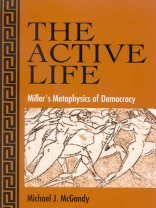A sustained reflection on philosopher John William Miller and the metaphysical presuppositions and implications of democracy.
The ancient antagonism between the active and the contemplative lives is taken up in this innovative and wide-ranging examination of John William Miller’s effort to forge a metaphysics of democracy. The Active Life sheds new light on Miller’s actualist philosophy-its scope, its systematic character, and its dialectical form. Michael J. Mc Gandy persuasively sets Miller’s actualism in the context of Hannah Arendt’s understanding of the active life and skillfully presents actualism as a response to Whitman’s challenge to craft a democratic form of metaphysics. Mc Gandy concludes that Miller reveals how the philosophical and the political are inextricably connected, how there is no active life without the contemplative life, and that the contemplative life is founded in the active life.
Tabella dei contenuti
Preface
List of Abbreviations
Introduction: The Active and Contemplative Lives
1. A Metaphysics of Democracy?
1.1 Senses of Democracy
1.2 America’s Antimetaphysical Tradition
1.3 Rorty’s Challenge
1.4 Miller’s Antimetaphysical Sympathies
1.5 Revisions of Metaphysics and History
1.6 Reinvigorating Criticism
1.7 Conclusion
2. Action
2.1 The Disclosure of Action
2.2 Dialectic and Definition
2.3 Dialectic and Action
2.4 Action as Constructive
2.5 Conclusion
3. Symbol
3.1 Symbolic Environment
3.2 The Midworld: Signs and Symbols
3.3 The Midworld: Symbols and Artifacts
3.4 Interpretation
3.5
Res Publicae
3.6 Conclusion
4. History
4.1 History as Constitutional
4.2 Fate, Demonry, Nemesis
4.3 Conflict, Revision, Action
4.4 Reflection and Autonomy
4.5 History and Philosophy
4.6 Conclusion
5. Democracy
5.1 The Metaphysics of Morals
5.2 Liberal Democracy
5.3 The State: Universality and Process
5.4 Democracy and Philosophy
5.5 Conclusion
Epilogue: The Scholar and the Citizen
Notes
References
Index
Circa l’autore
Michael J. Mc Gandy is Associate Managing Editor for Norton Professional Books.












